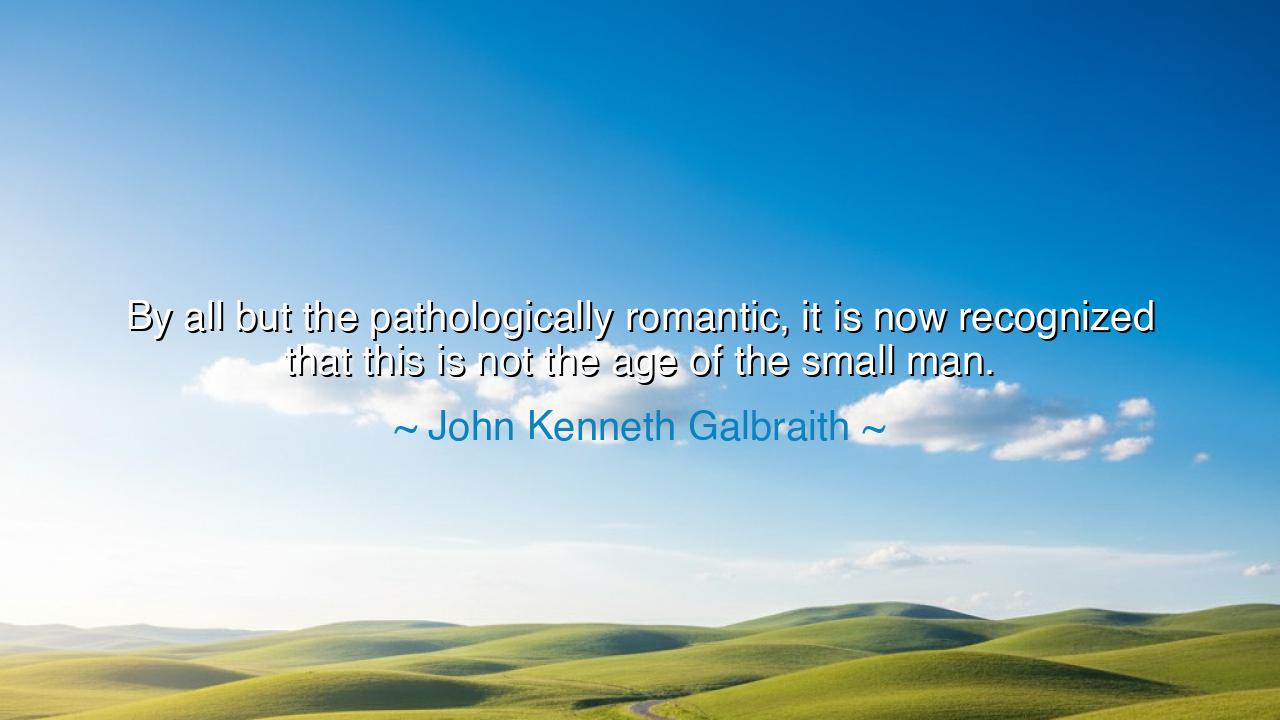
By all but the pathologically romantic, it is now recognized that
By all but the pathologically romantic, it is now recognized that this is not the age of the small man.






In the words of John Kenneth Galbraith, “By all but the pathologically romantic, it is now recognized that this is not the age of the small man.” These words were spoken by an economist, yes—but they resound like the lament of a philosopher who had looked deep into the soul of his century and found it transformed. Galbraith, writing in the mid-twentieth century, witnessed the rise of vast corporations, mighty governments, and institutions whose power dwarfed the individual. His statement is both a reflection and a warning: that in the modern world, the individual of modest scale—the small man—has been overshadowed by the machinery of the age. The era of personal independence, of the craftsman and the village thinker, has yielded to an epoch ruled by systems, organizations, and collective forces beyond any single person’s command.
The “small man”, in Galbraith’s sense, is not small in dignity, but in reach. He is the man or woman of simple means, who once found freedom and purpose in the independence of their work and community. In earlier ages, such a person could stand tall in their own sphere—a farmer sustaining a family from the land, a merchant shaping his destiny through trade, an artisan mastering a single craft. Their labor was their identity, their livelihood their art. But as the world grew more interconnected, more industrialized, more dominated by immense institutions, the scale of life shifted. Power concentrated into towers of bureaucracy and vast machines of commerce. The age of the small gave way to the age of the colossal.
Galbraith, ever the realist, saw this not as an accident, but as the natural evolution of a world seeking efficiency and coordination. He wrote during a time when corporations had become mightier than nations, when the atom had been split and the skies conquered. This was no longer the world of individuals shaping history with bare hands—it was the world of systems shaping individuals. And yet, his words carry a sorrow, for he knew what was being lost: the intimacy of self-reliance, the pride of mastery, the moral weight of personal accountability. In the new age, men and women were becoming cogs in engines too vast to comprehend, their individuality dimmed beneath the glow of progress.
Consider the story of Henry David Thoreau, who in the previous century retreated to Walden Pond to live deliberately, to test whether a man could still be complete unto himself. Thoreau sought to prove that simplicity was power, that greatness could be found not in scale, but in authenticity. His experiment was a cry against the growing noise of the industrial world. But by Galbraith’s time, Thoreau’s vision had become a kind of romantic dream—noble, but impractical in an age where survival depended on participation in massive systems of economy, communication, and governance. The pathologically romantic, Galbraith called those who still believed such independence could thrive. To him, it was an illusion—beautiful, but broken by reality.
And yet, there is wisdom in both men. Galbraith reminds us to face the world as it is: large, complex, interdependent. But Thoreau reminds us to preserve the spirit of the small man, even when his world no longer exists. The challenge, then, is not to mourn the loss of individuality, but to carry its flame into the vastness of the modern age—to find one’s integrity within systems that would strip it away. For though the world has grown large, the soul has not. The conscience of a single human remains as powerful as ever, capable of shaping morality, art, and meaning even in the shadow of giants.
The lesson is clear: we live not in the age of the small man, but the age of the vast machine. Yet within each of us lies the choice to remain awake, to refuse to be swallowed whole by systems of convenience or conformity. Build your work with intention. Speak truth, even if your voice is one among millions. Seek excellence, not dominance; authenticity, not applause. The world may reward scale, but it still honors substance.
So, my child, remember Galbraith’s wisdom: do not cling blindly to nostalgia, for the old world will not return. But neither surrender your soul to the magnitude of the new one. The small man may no longer rule the earth, but his courage, conscience, and craft remain the foundation of all that endures. Stand firm within the storm of systems—be small, if you must, but be mighty in spirit. For in every age, though the world belongs to the powerful, it is the steadfast heart of the individual that gives it meaning.






AAdministratorAdministrator
Welcome, honored guests. Please leave a comment, we will respond soon